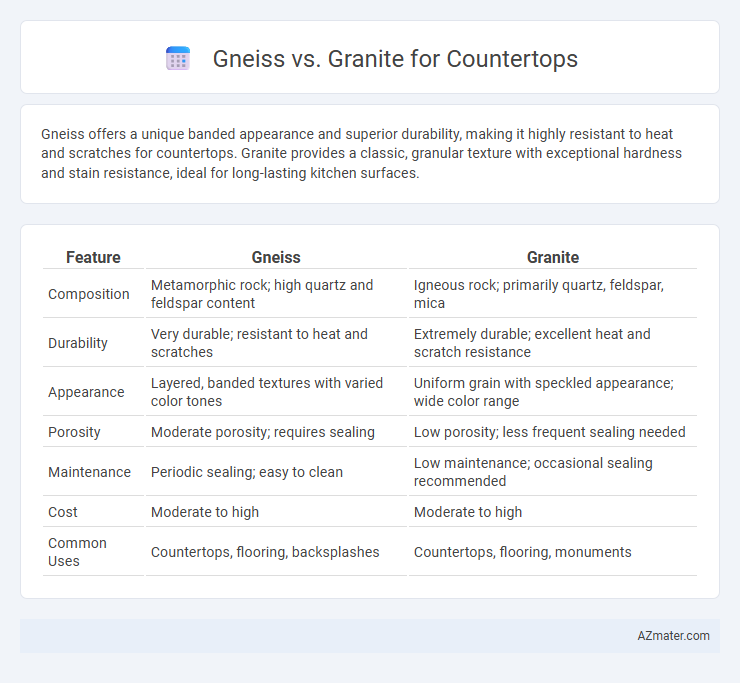Gneiss offers a unique banded appearance and superior durability, making it highly resistant to heat and scratches for countertops. Granite provides a classic, granular texture with exceptional hardness and stain resistance, ideal for long-lasting kitchen surfaces.
Table of Comparison
| Feature | Gneiss | Granite |
|---|---|---|
| Composition | Metamorphic rock; high quartz and feldspar content | Igneous rock; primarily quartz, feldspar, mica |
| Durability | Very durable; resistant to heat and scratches | Extremely durable; excellent heat and scratch resistance |
| Appearance | Layered, banded textures with varied color tones | Uniform grain with speckled appearance; wide color range |
| Porosity | Moderate porosity; requires sealing | Low porosity; less frequent sealing needed |
| Maintenance | Periodic sealing; easy to clean | Low maintenance; occasional sealing recommended |
| Cost | Moderate to high | Moderate to high |
| Common Uses | Countertops, flooring, backsplashes | Countertops, flooring, monuments |
Introduction to Gneiss and Granite Countertops
Gneiss and granite are popular natural stone choices for countertops, valued for their durability and unique aesthetics. Gneiss features a banded or foliated appearance due to its metamorphic nature, offering striking patterns and varied color combinations. Granite, an igneous rock, is known for its granular texture and consistent speckled colors, providing a strong and heat-resistant surface ideal for kitchen use.
Geological Origins: Gneiss vs Granite
Gneiss originates from high-grade metamorphism of pre-existing rocks, often granite or sedimentary formations, resulting in a foliated texture with alternating mineral bands. Granite forms from the slow crystallization of magma deep within the Earth's crust, characterized by a coarse-grained texture composed primarily of quartz, feldspar, and mica. The distinct geological origins of gneiss and granite influence their durability and aesthetic patterns, impacting their suitability for countertop applications.
Appearance and Aesthetics Comparison
Gneiss countertops feature a unique banded or foliated appearance with intricate swirls and contrasting mineral layers, offering a natural, textured aesthetic that varies widely in color and pattern. Granite countertops provide a more uniform granular look with speckled patterns and a polished finish, available in a broad spectrum of colors, enhancing classic kitchen designs with durability and shine. The choice between gneiss and granite centers on whether a homeowner prefers the bold, dynamic veining of gneiss or the consistent, polished elegance of granite for countertop aesthetics.
Durability and Strength Differences
Gneiss countertops offer exceptional durability due to their crystalline structure formed under high pressure, making them highly resistant to heat, scratches, and chips. Granite, known for its natural strength and density, provides superior toughness and longevity with a slightly higher resistance to impact compared to gneiss. Both materials excel in countertop applications, but granite generally exhibits greater hardness on the Mohs scale, whereas gneiss showcases better resistance to fracturing under stress.
Maintenance and Care Requirements
Gneiss countertops require minimal maintenance due to their natural durability and resistance to heat and scratches, needing only regular sealing to prevent staining. Granite countertops also offer excellent durability but demand more frequent sealing and careful cleaning to avoid damage from acidic substances and prolonged moisture exposure. Both materials benefit from non-abrasive cleaners and prompt spill cleanup to maintain their aesthetic and structural integrity over time.
Cost Comparison: Gneiss vs Granite
Gneiss countertops generally cost less than granite, with prices ranging from $40 to $70 per square foot compared to granite's $50 to $100 per square foot, making gneiss a more budget-friendly option. The cost difference is mainly due to the availability and mining processes, as granite is more widely quarried and comes in more premium varieties. Homeowners seeking a durable and visually appealing stone without the higher price tag often prefer gneiss for kitchen and bathroom countertops.
Heat and Stain Resistance
Gneiss countertops offer excellent heat resistance due to their natural formation under high temperatures, making them less prone to thermal shock compared to granite. Granite, while also heat-resistant, may suffer discoloration or surface damage from prolonged exposure to extreme heat if not properly sealed. Both materials require sealing to enhance stain resistance, but granite is generally more porous, necessitating more frequent sealing to prevent absorption of oils and liquids.
Installation Challenges and Considerations
Gneiss countertops present unique installation challenges due to their banded texture and varying hardness, requiring specialized cutting tools and careful handling to prevent chipping along the layers. Granite is generally more uniform and easier to work with, but it demands precise leveling and strong adhesion because of its weight and potential for cracking under improper support. Both materials necessitate skilled installers familiar with natural stone properties to ensure durability and a seamless finish in kitchen or bathroom countertops.
Best Uses and Applications in the Home
Gneiss countertops offer superior durability and unique banded patterns, making them ideal for high-traffic kitchen islands and bathroom vanities where both strength and aesthetic appeal are essential. Granite provides excellent heat resistance and a wide range of colors, perfect for kitchen countertops and backsplashes that require long-lasting performance and easy maintenance. Both materials excel in areas exposed to moisture and wear, but gneiss is often preferred for its enhanced toughness in heavy-use environments.
Which is Better: Gneiss or Granite for Countertops?
Granite offers superior durability and heat resistance compared to gneiss, making it a more practical choice for kitchen countertops that endure heavy use. Gneiss, with its unique foliated texture and natural banding patterns, provides distinctive aesthetic appeal but may require more maintenance due to variable hardness. Both stones are natural and long-lasting, but granite's uniform hardness and stain resistance generally position it as the better option for functional countertop surfaces.

Infographic: Gneiss vs Granite for Countertop
 azmater.com
azmater.com